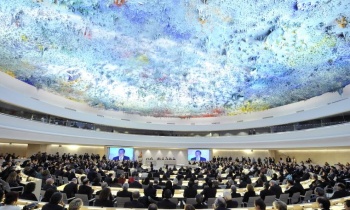QUNO’s Human Impacts of Climate Change Program (HICC) participated in the 58th Session of the Human Rights Council, delivering two statements addressing climate justice and human rights. Both statements were given on behalf of the Friends World Committee for Consultation (FWCC) and in collaboration with Soka Gakkai International (SGI).
QUNO first participated in the Interactive Dialogue with the UN Independent Expert on the Effects of Foreign Debt and responded to her report on "Understanding the landscape of climate finance, debt, tax and illicit financial flows and human rights", highlighting the profound inequities posed by high rates of foreign debt amidst the ongoing need for climate finance. QUNO shared support for the Independent Experts’ findings and highlighted the necessity of debt cancellation and alternative spending priorities. HICC also emphasized the opportunity for developed countries to shift funds from military spending to climate finance, and the effect this would have for vulnerable countries already struggling to adequately fund climate, health, and education services while keeping up with foreign debt interest payments.
Later in the week, QUNO gave a statement during an Interactive Dialogue with the UN Special Rapporteur on the human right to a clean, healthy and sustainable environment. Addressing her report on "The ocean and human rights", QUNO expressed gratitude for her work showing how the right to a healthy environment inextricably relies on ocean health and conservation. HICC highlighted the report’s concerns regarding marine geoengineering technologies and their failure to address the root causes of climate change. The statement also upheld the need for sustainable ocean practices that will prevent further fossil fuel extraction and resulting threats to ocean biodiversity and health.
Both statements provided an opportunity for HICC to support the important work of these UN experts in linking human rights with pressing climate and environmental concerns closely connected to QUNO’s values of equality, peace, and sustainability. We are grateful to Soka Gakkai International for their support, collaboration and joint endorsement.
Please find the Human Rights Council reports and FWCC/SGI full written statements available for download.







